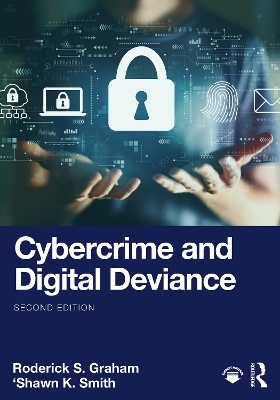
Cybercrime and Digital Deviance
Routledge (Verlag)
978-1-032-24919-3 (ISBN)
Cybercrime and Digital Deviance, Second Edition, combines insights from sociology, criminology, psychology, and cybersecurity to explore cybercrimes such as hacking, identity theft, and romance scams, along with forms of digital deviance such as pornography addiction, trolling, and “canceling” people for perceived violations of norms.
Other issues are explored including cybercrime investigations, nation-state cybercrime, the use of algorithms in policing, cybervictimization, and expanded discussion of the theories used to explain cybercrime. Graham and Smith conceptualize the online space as a distinct environment for social interaction, framing their work with assumptions informed by their respective work in urban sociology and spatial criminology, and offering an engaging entry point for understanding what may appear to be a technologically complex course of study. The authors apply a modified version of a typology developed by David Wall: cybertrespass, cyberfraud, cyberviolence, and cyberpornography. This typology is simple enough for students just beginning their inquiry into cybercrime, while its use of legal categories of trespassing, fraud, violent crimes against persons, and moral transgressions provides a solid foundation for deeper study. In this edition each chapter includes a new “Current Events and Critical Thinking” section, using concepts from the chapter to explore a specific event or topic like the effect of disinformation on social cohesion and politics.
Taken together, Graham and Smith’s application of a digital environment and Wall’s cybercrime typology makes this an ideal upper-level text for students in sociology and criminal justice. It is also an ideal introductory text for students within the emerging disciplines of cybercrime and cybersecurity.
Roderick S. Graham is an Associate Professor of Sociology in the Sociology and Criminal Justice Department at Old Dominion University. He teaches courses on cybercrime, research methods, and racial inequality. He has published research in Deviant Behavior, First Monday, and Youth and Society. ‘Shawn K. Smith is a Criminologist and Associate Professor of Criminal Justice in the Department of Criminal Justice at Radford University. His areas of research and pedagogy include social networking theories in crime, public policy in criminal justice, and advanced research procedures. He has published research in Sociological Focus, Journal of Race and Ethnicity, Criminal Justice Studies: A Critical Journal of Crime, Law, and Society, and African Journal of Criminology and Justice Studies.
1. Understanding Cybercrime and Digital Deviance 2. Cybertrespass 3. Cyberpornography 4. Cyberviolence 5. Cyberfraud 6. Policing the Digital Experience 7. Organized Cybercrime, State Crimes, and Cyberterrorism 8. Algorithms, AI, and Big Data 9. Cybervictimization 10. Cybercriminology
| Erscheinungsdatum | 16.04.2024 |
|---|---|
| Zusatzinfo | 30 Tables, black and white; 15 Halftones, black and white; 15 Illustrations, black and white |
| Verlagsort | London |
| Sprache | englisch |
| Maße | 178 x 254 mm |
| Gewicht | 453 g |
| Themenwelt | Geisteswissenschaften ► Geschichte |
| Recht / Steuern ► EU / Internationales Recht | |
| Recht / Steuern ► Strafrecht ► Kriminologie | |
| Sozialwissenschaften ► Soziologie | |
| ISBN-10 | 1-032-24919-6 / 1032249196 |
| ISBN-13 | 978-1-032-24919-3 / 9781032249193 |
| Zustand | Neuware |
| Informationen gemäß Produktsicherheitsverordnung (GPSR) | |
| Haben Sie eine Frage zum Produkt? |
aus dem Bereich


